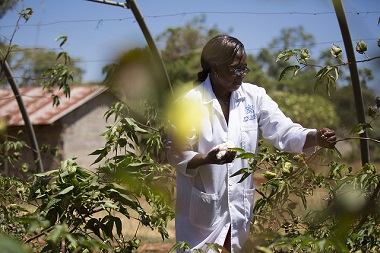The following post was written by David Spielman, Carlo Azzarri and Patrick Ward from IFPRI’s Environment and Production Technology Division.
As researchers working on agricultural development programs in South Asia and Africa, there are a lot of agronomists in our world. Despite being IFPRI economists working on agricultural science and policy issues, a lot of our work hinges on what agronomists do–the technologies, practices, and systems they develop with and for farmers, especially resource-poor farmers in developing countries.
In fact, there are so many agronomists in our respective worlds that we are only slightly joking when we say we are considering pursuing degrees in agronomy. Writing a dissertation is still too fresh a memory for some of us, so for now, we are satisfied simply hanging out with agronomists, whether in the field, at a conference, or over a cup of coffee (or chai).
Little did we know that agronomy– like economics and many other disciplines–is such a hotly contested discipline. The causes and consequences of these contests and the knowledge politics surrounding these hot-button agronomic issues were the focus of an exciting conference convened by the Institute for Development Studies at the University of Sussex, UK, titled “Contested agronomy: Whose agronomy counts?”
Thankfully, not all participants at the conference were agronomists–disciplinary homogeneity in a confined conference space would be far too dull. Plenty of other researchers from both the natural and social scientists contributed. Together, we all converged around a single, rather important point.
Agronomy has emerged at the center of global efforts to sustainably enhance agricultural productivity and address food security challenges. In fact, it could be argued that agronomy is the lynchpin underlying some of our donors’ most significant– and arguably successful–investments in agricultural and rural development. Yet agronomy is a discipline that often refuses to commit under the spotlight. When asked if and where a particular agronomic intervention works in terms of providing viable solutions for resource-poor smallholder farmers, many agronomists fall back on that common refrain that was previously associated with our own discipline: “Well, it depends.”
A blog by Jim Sumberg, one of the conference organizers, puts this in perspective by raising important questions about why we should care about the growing global discussion around agronomists’ priorities and methods, as well as the technologies, practices, and systems they promote.
Critically, that is where the debate comes into play. Agronomic research is rife with evidence, counter-evidence, refutations, and controversy around its contribution to social and economic development. Battles continue to rage around the system of rice intensification (SRI) and its progeny related to wheat, pulses, tef, and roots; conservation agriculture (CA); sustainable intensification (SI); climate-smart agriculture (CSA); genetically modified (GM) crops; and so many other technologies, practices, and systems.
Importantly, we emerged from the conference with a realization that agronomy is framed around competing narratives–and sometimes even competing semantics–and that there are few immutable, globally-applicable scientific truisms in agronomy. More than localized soil, rainfall, and other weather conditions, or new technologies or practices, it is people and communities that determine agronomy’s contribution in ushering social and economic change. But while some of the agronomists participating in the conference may have had an appreciation for these nuances, they lack neither the theoretical nor methodological tools with which to think critically about these issues or how to implement them in their development programs.
This is where economists and other social scientists have an important role to play in this drama. As economists–and social scientists more generally–we specialize in studying people and communities and how agronomic solutions both affect and are affected by complex interactions involving individual, household, and collective decisionmaking.
What does all this mean for the future of our work on science policy, technological change, and innovation? From our perspective, there is a clear understanding that we need agronomists as much as they need us, as well as sociologists, anthropologists, and other social scientists. We are hopeful that the agronomists participating in the conference arrived at this realization as well. Together, we can probably agree that there are few global truths or axioms, but a lot of space for fruitful dialogue, discussion, and debate. That may not sit well with governments, donors, and development practitioners searching for discrete, measurable, and actionable solutions. But the realities of development are messy, so we should get used to it.







